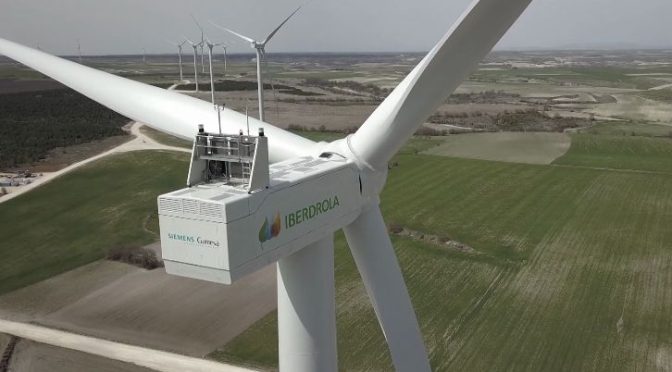The company has promoted wind energy and solar projects in eleven autonomous communities. Iberdrola – which has accelerated its investment plan to contribute to the economic recovery – plans to commission a further 1,500 MW of renewables in the near future, of which 1,000 MW are already under construction.
Iberdrola has consolidated its position as the main driver of renewable energy development in Spain with the commissioning of 2,000 MW of new wind and solar capacity during the pandemic, which has meant a growth of more than 35% of our installed renewable capacity in Spain.
76% of the new developments correspond to photovoltaic installations. Of these, the Núñez de Balboa plant in Extremadura stands out, which, with 500 MWdc, is capable of supplying clean energy to 250,000 people. In this region, the company has also commissioned plants in Ceclavin (328 MWdc), Arenales (150 MWdc) and the Campo Arañuelo complex (143 dc), the latter a pioneer in incorporating an energy storage system through a 3 MW battery.
It is also worth mentioning the 50 MWdc Andévalo photovoltaic plant in Andalusia, built as part of the wind power complex of the same name – the largest in continental Europe – and which has become the first facility to obtain the ‘UNEF Certificate of Excellence for Sustainability and Biodiversity Conservation’.
The acceleration of its renewable strategy has enabled Iberdrola to start up its first three photovoltaic plants in Castilla-La Mancha in 2021: Barcience (50 MWdc), Olmedilla (50 MW) and Romeral (MW). Also in Aragon, the company has installed in Teruel the first photovoltaic plant to be built in this region, with 50 MW.
Iberdrola has also strengthened its leadership as a wind power developer in Spain, with nearly 500 MW installed since 2019. Castilla y León was the autonomous community with the most megawatts installed by the company, with the commissioning of the Encillas (23 MW), BaCa (69 MW), Fuenteblanca (10 MW) and the Herrera II complex (63 MW), equipped with the most powerful wind turbines in Spain to date, with more power than the first ones installed two decades ago.
In Asturias, the company has tripled its installed wind capacity, with four new wind farms totalling 129 MW. In Navarra, Iberdrola has commissioned the 111 MW Cavar wind farm complex, the largest facility of its kind to come on stream in the country since 2012. The company has also installed the Puylobo (49 MW) and Pradillo (23 MW) wind farms in Aragon.
1,500 MW more renewables in Spain
Iberdrola is currently building 1,000 MW of renewable energy in Spain. These include the Pizarro photovoltaic plant which, with its 590 MWp of installed capacity, will be the largest in Europe, will prevent the emission of 150,000 tonnes of CO2 and will supply energy to 334,4000 homes. The Cedillo (100 MW) and Almaraz I and II (80 MW) photovoltaic facilities are also under construction in this community.
In Andalusia, the company is building the Martín de la Jara (36 MW) and El Puntal (15 MW) wind farms. In Castilla-La Mancha, it is installing a 100 MW photovoltaic plant in Puertollano, the largest green hydrogen plant for industrial use in Europe. In Castilla y León, work continues on the Revilla-Vallejera photovoltaic plant (50 MW) and in the Basque Country it will install the first battery in a wind power project, at the Elgea-Urkilla wind farm.
In addition, Iberdrola already has environmental authorisations for the construction of another 500 MW in various wind and photovoltaic projects in Castilla y León, Cantabria, Castilla la Mancha, Andalusia, the Canary Islands and Murcia.
Ambitious renewables investment plan
The strong expansion of Iberdrola’s renewable generation system in Spain responds to the ambitious investment plan that the company has accelerated in order to contribute to the reactivation of economic activity and employment.
“Our business model, which has anticipated the energy transition by 20 years, positions us as a key player in the transformation of the industrial fabric, using our experience, social commitment and financial capacity to promote a long-term sustainable economic growth model capable of meeting the current challenges facing society”, explained Julio Castro, CEO of Iberdrola Renovables Energía.
Since 2019 – and despite the crisis generated by the health emergency – the company has allocated more than 2.3 billion euros to renewable development in Spain.
Likewise, the projects promoted by Iberdrola have boosted the local supply chain. “Iberdrola has always been committed to local suppliers in the development of all its projects in order to contribute to the development of the territories, strengthening their economy and generating local employment. An example of our commitment is the acquisition of our transformers from the company FARAMAX, in Extremadura, or from ABB, in Cordoba, or the awarding of the structures of our photovoltaic plants to the company Cameto in Ciudad Real and of inverters to the Basque company Ingeteam”, said Castro.
Key agent for economic recovery
Iberdrola has been leading the energy transition for two decades, acting as a key driving force in the transformation of the industrial fabric and the green recovery of the economy and employment. To this end, the company has launched a historic investment plan of 150 billion euros over the next decade -75 billion euros by 2025-, with which to triple renewable capacity and double network assets and take advantage of the opportunities of the energy revolution facing the world’s leading economies.
In Spain, investments to 2025 amount to 14.3 billion euros, mainly for the deployment of an ambitious renewables and smart grids plan. In Spain, the company is the leader in the renewable sector with an installed capacity of more than 17,400 MW, which its investment plan to 2025 will increase to 25,000 MW.
After investments of 120 billion euros in the last twenty years, Iberdrola is a leader in renewable energy with more than 35,000 MW installed worldwide; a volume that makes its generation system one of the cleanest in the energy sector.

